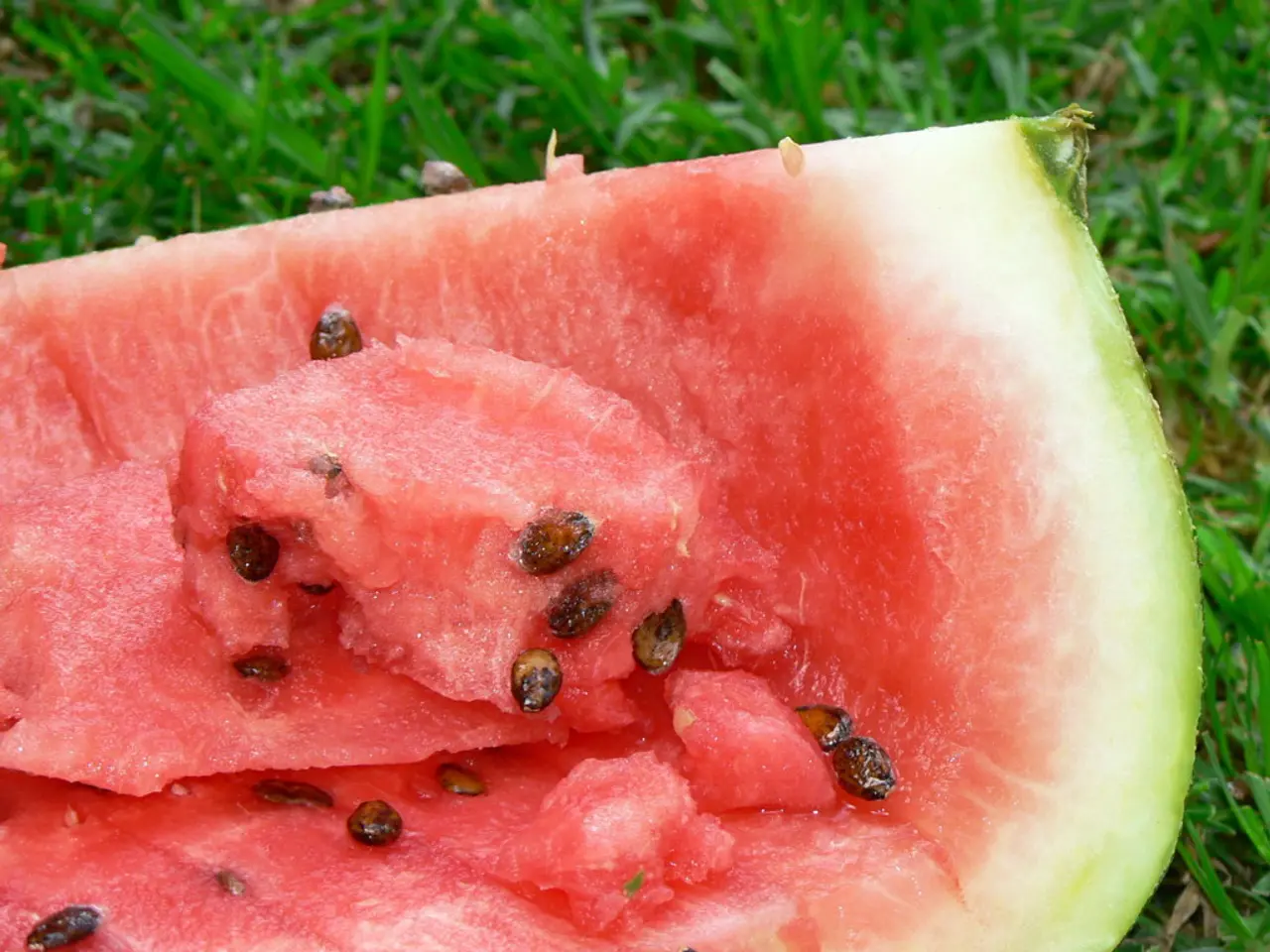Watermelon: Exploring the health benefits, nutritional value, and potential risks associated with consuming this refreshing fruit
**Watermelon: Hydrating Superfruit with Potential Health Benefits**
Watermelon, a summertime favourite, offers a refreshing burst of flavour and multiple health benefits. This juicy fruit, comprising about 92% water, is packed with essential nutrients and antioxidants, making it an ideal choice for maintaining hydration and supporting overall well-being.
One of the key components of watermelon is its antioxidant content. Rich in vitamin C and lycopene, watermelon supports immune function and skin health by promoting collagen production and fighting oxidative stress. Lycopene, a carotenoid antioxidant, may help reduce oxidative damage linked to chronic diseases.
Watermelon's high water and fibre content can aid digestion and prevent constipation, but overconsumption may cause bloating or diarrhea due to its fructose content. The fruit's hydrating properties help maintain body fluid balance and electrolyte levels in normal consumption.
A study in 2019 suggested that watermelon may affect certain features of metabolic syndrome, including obesity and cardiovascular measures. Those who ate watermelon had a lower body weight and body mass index (BMI). Additionally, the amino acid citrulline found in watermelon may improve blood flow by dilating blood vessels, potentially helping to reduce blood pressure and support cardiovascular health.
The potential anticancer effects of lycopene have been studied, with some evidence indicating it may help prevent or slow the progression of prostate cancer. However, definitive clinical evidence is limited, and regular moderate intake may be beneficial but is not a substitute for medical treatment.
While watermelon offers numerous benefits, moderation is key to avoiding potential risks. Overconsumption can lead to digestive discomfort, blood sugar spikes, potassium overload, and low blood pressure, especially in vulnerable populations like diabetics and those with kidney disease.
Individuals with allergies or special medical conditions should consult healthcare providers before making watermelon a major dietary component. Those with known allergies to related fruits should exercise caution, as severe allergic reactions, including anaphylaxis, are possible.
When purchasing a ripe watermelon, look for one that is firm, heavy, and symmetrical, with no soft parts or bruising. A creamy yellow spot on the underside of the watermelon indicates the fruit is ripe.
In conclusion, watermelon offers multiple health benefits mainly due to its antioxidant content, hydration properties, and potential cardiovascular support. Moderate consumption (about one cup daily) generally provides beneficial effects without significant risk. However, individuals with specific health concerns should consult a healthcare professional before incorporating watermelon into their diet.
- Watermelon's high antioxidant content, rich in vitamin C and lycopene, supports immune function and healthy skin.
- Watermelon, with its essential nutrients and antioxidants, is beneficial for macular degeneration, an age-related eye health concern.
- For people suffering from multiple chronic diseases like diabetes, it's crucial to consider watermelon's impact on blood sugar levels.
- Other nutrition sources should be included in a well-balanced diet, alongside watermelon, to optimize health-and-wellness.
- Consumption of watermelon may aid in the management of chronic conditions like obesity, given the study in 2019 that showed lower body weight and BMI in participants.
- The amino acid citrulline present in watermelon could possibly help manage conditions like psoriasis, a chronic inflammatory skin disease.
- Another potential benefit of watermelon is in the prevention and slowing of degeneration associated with conditions like multiple sclerosis.
- In the kitchen, think beyond just eating watermelon as a fruit—try incorporating it into healthy-cooking recipes and global cuisines for added nutrition.
- Watermelon, due to its hydration properties, may help protect against dehydration during fitness-and-exercise.
- While lycopene may have anticancer effects, particularly against NSCLC, more research is needed for definitive clinical evidence.
- A regular moderate intake of watermelon, about one cup daily, could be beneficial for maintaining cardiovascular health.
- Overconsumption of watermelon, however, can lead to unwanted digestive discomfort, potassium overload, blood sugar spikes, and low blood pressure.
- Dry skin conditions, such as those caused by ulcerative colitis, may find relief from the hydrating properties of watermelon.
- Preventative measures should be taken by those suffering from autoimmune diseases like type 1 diabetes, as watermelon may interact with certain medications.
- AQ (aqueous) extract of watermelon has shown promise in predictive studies for diabetes, suggesting that watermelon could potentially help manage blood sugar levels.
- Science continues to unveil the potential benefits of watermelon for various health situations, from improving dry skin to reducing the risk of cervical cancer, cancer of the cervix.
- Proper nutrition, including watermelon, plays a crucial role in maintaining cardiovascular health, eye-health, and overall well-being.
- Practice safe cooking techniques and proper food-and-drink handling to minimize foodborne illnesses and maximize the benefits of incorporating watermelon into your lifestyle.




